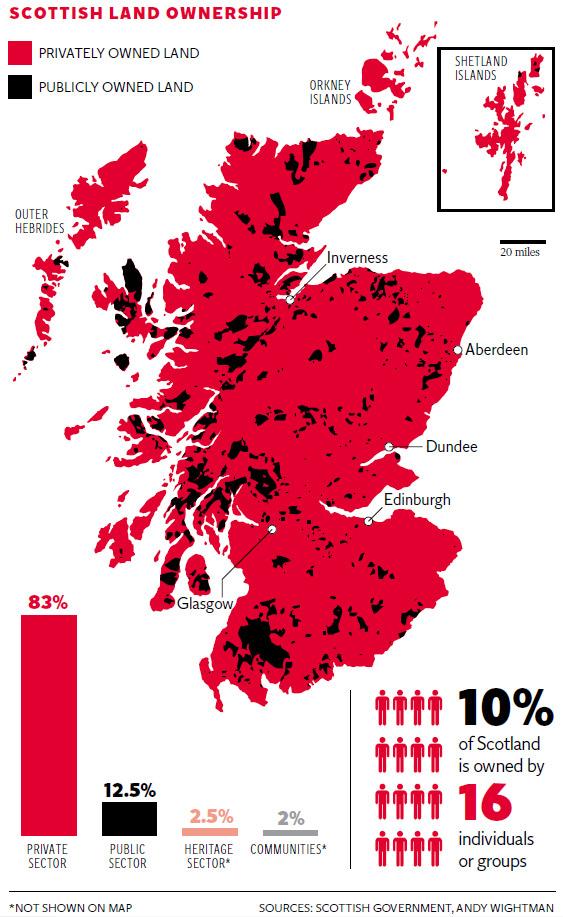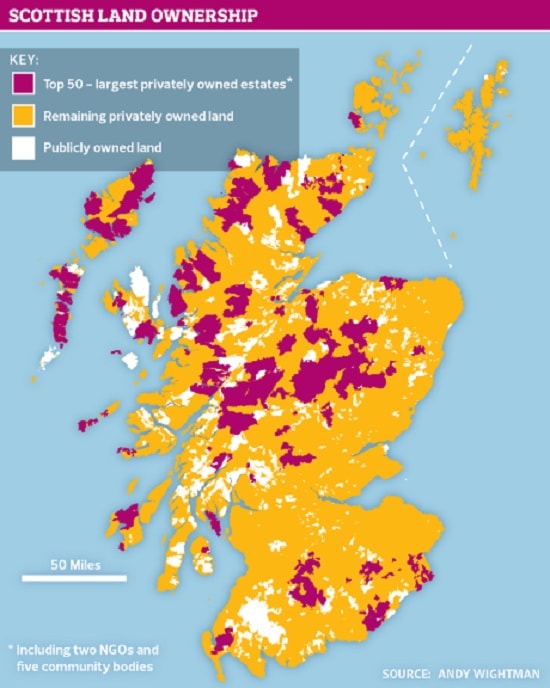
Scotland continues to have the most unequal land ownership in the western world. The concentration of land in the hands of a wealthy few has been the established norm for hundreds of years and, despite all the window dressing, there has been no serious challenge made to this by the Scottish National Party (SNP) since they took political power in 2007. The SNP are first and foremost a capitalist party, as is demonstrated by their hostility towards land reform. Any claims to ‘nationalism’ come second to this. Turning the tide on this inequality and injustice will require the working class to challenge those who hold the land and the power, the parasitic capitalist class, along with all their political servants.
On 20 March the Scottish Land Commission published the findings of their ‘Investigation into the issues associated with scale and concentration of land ownership in Scotland’. Highlighting the ‘unregulated’ approach to land ownership it was found that a ‘land monopoly’ existed in many areas and that in ‘some parts of Scotland concentrated land ownership appears to be causing significant and long-term damage to the communities affected’. They went on to say that abuses of power by landowners went unpunished and were very often unpunishable under existing laws as ‘landowners have the power to decide who can access land, when, for what purpose and at what price. This power is created by the current system of private property rights and is therefore linked directly to land ownership.’
A number of recommendations were made to the Scottish government on how these issues could be tackled including a ‘public interest test for significant land transfers’. Kicking these recommendations into the long grass, the Scottish government will ‘consider’ and reconsider adoption after further consultation with interested parties including landowners. An indicator of their intentions came in June as the SNP and Conservatives joined forces to vote down amendments to parliamentary bills proposing to give communities the same rights of appeal as private developers in terms of planning.
Local communities are themselves leading opposition to the private developers and the Scottish government agencies working with them. A planning application to build a new ‘Flamingo Land resort’ in Loch Lomond, which private developers admit will pollute, damage and destroy wildlife, woodland and water has drawn opposition from more than 57,000 people. The jobs promised for the local community have been exposed as zero-hours contracts. Still the government agency who own the land, Scottish Enterprise, as well as Loch Lomond and The Trossachs National Park Authority, selected Flamingo Land Ltd as the preferred developer.
For those seeking radical change the SNP are clearly part of the problem and not the solution. The ten-year Scottish government project to find out who owns every part of Scotland has only mapped out a third of the country’s total land mass so far. Green MSP and prominent land campaigner Andy Wightman has said that the 2024 target is unlikely to be met and that it was easier to find out who owned land in Scotland in 1915 than it is today. He estimates that around 750,000 acres of land are owned in offshore tax havens like the British Virgin Islands and Cayman Islands. The proposal by land campaigners to outlaw this type of ownership was rejected by the Scottish parliament in 2016. As for the target for one million acres of land to be in community ownership by 2020, the latest published figures, which cover 2017, show that this target is unlikely to be met with just over half of that target (547,690.57 acres) so far reached, with only small annual increases.
According to the Scottish government, 57% of rural land is privatised, around 12.5% owned by public bodies, just 3% is under community ownership and about 2.5% is owned by charities and other third sector organisations. Wightman’s uncovering work has made him a target. His research of Scottish land ownership estimates that around half of all private land in Scotland is owned by just 432 families. Meanwhile the £915,000 defamation case brought against Wightman by Wildcat Haven Enterprises CIC, for writing about their activities online in 2015, continues with an eight day trial scheduled for October. If the court rules against him he faces bankruptcy which entails the automatic loss of his parliamentary seat.

The Danish billionaire and retail magnate Anders Holch Povlsen is Scotland’s largest private landowner. Since his first purchase of the 42,000 acre Glen Feshie estate in the Cairngorms for £8m in 2006 he has increased his holdings to 220,000 acres over 12 estates, mainly in the Highlands. Povlsen’s wealth is inherited from his father’s founding of the fashion business Bestseller and he is currently the largest single shareholder in British online fashion company Asos. The 10th Duke of Buccleuch (otherwise known as Richard Walter John Montagu Douglas Scott), whose family’s title in the Peerage of Scotland goes back to 1663, comes second with around 200,000 acres of land mainly in the south of Scotland; and other leading landowners include the billionaire ruler of Dubai, Sheikh Mohammed bin Rashid al-Maktoum, who owns about 63,000 acres of Scotland’s countryside. The Church of England is Scotland’s largest private forestry owner; its investment fund purchased 13 forestry plots in 2014 for over £40m.
As we highlighted in FRFI 253 (‘Scotland: who owns the land’), following the publication of the Global Justice Now report,
Scotland’s land system is not simply a ‘feudal relic’ but very much part of a global parasitic capitalism (imperialism) with ‘billionaire oilmen and Emirati princes, mineral conglomerates, London property speculators, online clothing retailers, Swiss bankers, and financiers of every sort’ claiming a stake alongside the Dukes of Buccleuch and Argyll.
Land banking, public subsidies for landowners and tax evasion and havens are all part of this robbers’ scheme. Building a movement which is conscious of the need to fight and overthrow capitalism, and all its political defenders, in order to achieve working class ownership of the land is our task today. The working-class answer to the ‘land question’ is socialism.
Dominic Mulgrew




